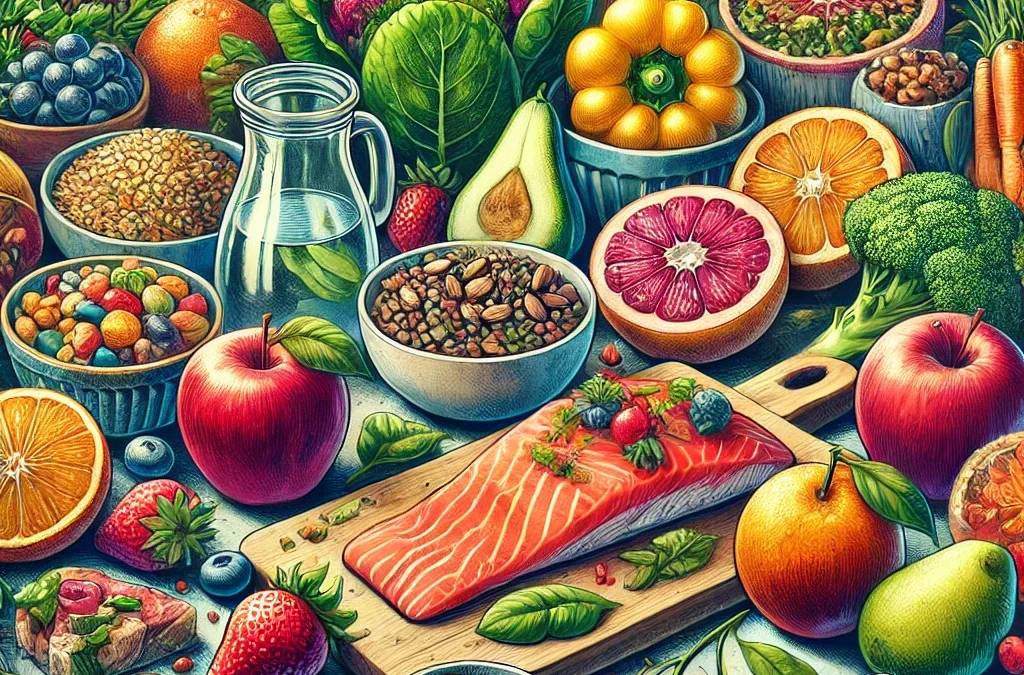Nutrition Myths Busted: What You Really Need to Eat for Optimal Health
In the world of nutrition, myths and misconceptions abound. From the idea that all fats are harmful to the belief that carbs should be avoided at all costs, many of these myths can cloud our understanding of what truly constitutes a healthy diet. To achieve optimal health, it’s essential to separate fact from fiction and understand the real science behind nutrition. Let’s take a closer look at some common nutrition myths and uncover what you really need to eat for vibrant health.
Myth 1: All Fats Are Bad for You
For years, dietary fat was vilified as the culprit behind weight gain and heart disease, leading to a surge of “low-fat” and “fat-free” products on supermarket shelves. However, research has since shown that not all fats are created equal, and certain types of fat are essential for optimal health.
The Truth:
Healthy fats, such as monounsaturated and polyunsaturated fats, are actually beneficial for the body. These fats support brain health, reduce inflammation, and help absorb fat-soluble vitamins (A, D, E, and K). Examples of healthy fats include:
- Avocado
- Nuts (like almonds and walnuts)
- Olive oil
- Fatty fish (such as salmon, mackerel, and sardines)
Trans fats and high amounts of saturated fats should still be limited, but incorporating healthy fats in moderation can enhance overall health and even aid in weight management by helping you feel full and satisfied.
Myth 2: Carbs Are the Enemy
Low-carb diets have gained popularity for their ability to induce quick weight loss. However, not all carbs are equal, and eliminating carbs altogether can lead to nutrient deficiencies and impact energy levels, especially if you live an active lifestyle.
The Truth:
Carbohydrates are the body’s primary source of energy, and not all carbs are detrimental. Complex carbs, like those found in whole grains, fruits, and vegetables, provide fiber, vitamins, and minerals that are vital for health. Instead of cutting carbs, focus on quality carbs, such as:
- Whole grains (brown rice, quinoa, oats)
- Legumes (beans, lentils, chickpeas)
- Fruits and vegetables
Refined carbs, such as white bread, pastries, and sugary drinks, can contribute to weight gain and should be limited, but whole, fiber-rich carbs are an essential part of a balanced diet and support long-term health.
Myth 3: Protein Only Comes from Meat
Protein is a crucial macronutrient that helps build and repair tissues, supports immune function, and maintains muscle mass. Some people believe that meat is the only reliable source of protein, but there are plenty of plant-based options that provide ample protein as well.
The Truth:
You don’t need to rely on meat to meet your protein needs. Many plant-based foods are rich in protein, and combining different sources can provide all the essential amino acids your body needs. Plant-based protein sources include:
- Legumes (lentils, chickpeas, black beans)
- Quinoa
- Nuts and seeds (chia seeds, almonds, hemp seeds)
- Tofu and tempeh
For those who do eat meat, choosing lean options like chicken, turkey, and fish is a good approach, while those on a plant-based diet can thrive with a variety of plant-based proteins.
Myth 4: Eggs Are Bad for Your Heart
Eggs have long been associated with high cholesterol, which led many people to avoid them for fear of increasing their risk of heart disease. However, recent research has revealed that the cholesterol in eggs doesn’t have as big of an impact on blood cholesterol levels as once thought.
The Truth:
Eggs are a nutrient-dense food packed with protein, vitamins, and minerals. They contain essential nutrients such as choline (important for brain health) and lutein and zeaxanthin (beneficial for eye health). Eating eggs in moderation (up to one per day for most people) is not only safe for heart health but also a valuable part of a balanced diet. For those with specific dietary needs or cholesterol issues, consult with a healthcare provider, but for most people, eggs are a heart-healthy option.
Myth 5: Detox Diets Are Necessary for Health
Detox diets and cleanses are often marketed as a way to rid the body of toxins and “reset” after periods of unhealthy eating. However, these diets are typically restrictive and lack scientific evidence.
The Truth:
Your body has a built-in detox system consisting of the liver, kidneys, lungs, and skin, which constantly work to eliminate waste. Rather than relying on detox diets, focus on foods that support these organs. A diet rich in antioxidants, fiber, and hydration will keep your body’s natural detoxification processes functioning optimally. Key foods to incorporate include:
- Leafy greens (kale, spinach)
- Cruciferous vegetables (broccoli, Brussels sprouts)
- Berries (blueberries, raspberries)
- Water (for hydration)
Eating a balanced diet, staying hydrated, and getting enough sleep and exercise are far more effective and sustainable than restrictive detox diets.
Myth 6: Supplements Can Replace a Balanced Diet
With the rise of vitamin and supplement use, many people believe they can rely on supplements to get their nutrients instead of focusing on food. While supplements can fill certain nutritional gaps, they’re not a substitute for a healthy diet.
The Truth:
Whole foods provide a complex combination of nutrients, fiber, and antioxidants that work together to promote health. Supplements can be helpful in cases of deficiencies or specific health needs (such as vitamin D during winter months or B12 for vegans), but they should complement—not replace—a well-rounded diet. Prioritize nutrient-dense foods like:
- Fresh fruits and vegetables
- Whole grains
- Lean proteins
- Healthy fats
If you’re considering supplements, consult with a healthcare provider to ensure you’re meeting your specific nutritional needs.
Myth 7: Fresh Is Always Better Than Frozen
There’s a common perception that fresh fruits and vegetables are more nutritious than frozen ones, leading some people to avoid frozen produce. However, frozen fruits and vegetables are often just as healthy as fresh ones, and in some cases, they can even retain more nutrients.
The Truth:
Frozen produce is typically flash-frozen at peak ripeness, which preserves its nutrient content. Fresh produce can lose nutrients during transport and storage, especially if it’s not eaten shortly after purchase. Frozen fruits and vegetables are a convenient and nutritious option, making it easier to incorporate more produce into your diet year-round.
Myth 8: Eating Small, Frequent Meals Boosts Metabolism
The idea of “eating every few hours” to boost metabolism has been popularized in recent years. While some people prefer smaller, frequent meals, there’s limited evidence to support the idea that it directly increases metabolic rate or aids in weight loss.
The Truth:
Meal frequency doesn’t significantly affect metabolism for most people. What matters more is the total caloric intake and the quality of food consumed. Some people feel best eating three meals a day, while others may prefer five smaller meals. The key is finding a routine that works for you and focusing on nutrient-dense foods that support energy and well-being.
Conclusion: What You Really Need to Eat for Optimal Health
When it comes to achieving optimal health, the key is a balanced, nutrient-dense diet that includes a variety of whole foods. Rather than following restrictive diets or falling for myths, focus on incorporating:
- Whole grains: For sustained energy and digestive health.
- Fruits and vegetables: Packed with vitamins, minerals, and antioxidants.
- Lean proteins: Supports muscle health and repair.
- Healthy fats: Essential for brain health and nutrient absorption.
- Hydration: Water is critical for all bodily functions.
- A balance of carbohydrates, proteins, and fats: Each plays a unique role in supporting overall health.
Eating in a balanced and mindful way, without succumbing to myths and fads, will help you achieve lasting health. It’s not about quick fixes but rather a sustainable approach that respects your body’s needs. With these principles, you’ll be well on your way to optimal health.





Recent Comments